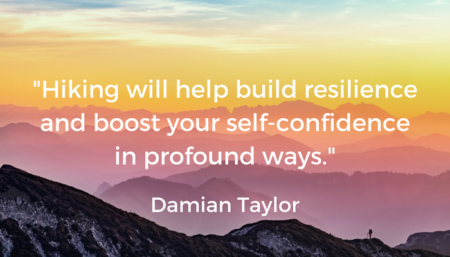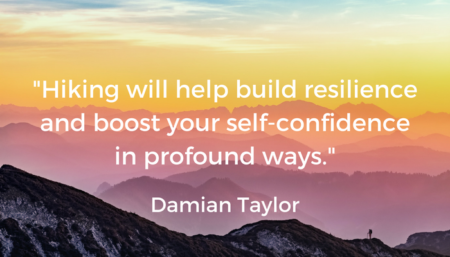
This post is written by guest Damian Taylor as a companion to interview with Ken Wylie, Outdoor Adventures, A School for Leadership and Discovery his interview, on the Voice America Radio Show, “Innovative Leaders Driving Thriving Organizations” on July 24, 2018.
As leaders, many of us struggle to find time to refresh our bodies, minds and spirits. I have been a hiker now for decades. Some of my most interesting vacations involved what were for me epic hiking trips such as climbing Kilimanjaro and hiking the Incan Trail. My next target is hiking a portion of the Camino.
As a leader, someone who is generally over committed with tasks and who values taking time to reflect, I find that waking daily and periodic hikes really support my overall success. I have engaged in walking meetings for years and on occasion actually do more hiking that walking meetings. These are with people I want to have indepth interactions with, often of a strategic nature.
This article talks about the benefit of hiking to address anxiety and depression along with building resilience. I want to point out that a significant percentage of our workforce struggles with these issues and we know that being out in the natural world can help address some of the symptoms. Whether you are attending to anxiety or taking time for reflection and strategic thinking, or doing both, hiking is a great option!
Anxiety and depression are incredibly common ailments of 21st Century humans. But while there are a number of different treatments for these illnesses (and you should always discuss your symptoms with your doctor and seek the treatment he or she recommends), too many people overlook one of the best: hiking.
Hiking is often very effective for easing anxiety and depression, and it is a treatment option that is accessible to the vast majority of people. In fact, there are a number of reasons hiking is such an excellent way to feel better, which we’ll outline below.
Exercise Promotes Brain Health
Hiking is a fantastic form of exercise that provides a variety of benefits for your body. It’ll help you lose weight while simultaneously strengthening your muscles. And if you keep at it for long enough, it’ll likely help lower your blood pressure and reduce your chances of suffering from strokes, diabetes or heart disease.
But while these benefits are all clearly valuable, exercise also helps to promote a healthy brain too. If your hikes are strenuous enough to elevate your heart rate and cause you to sweat a bit, they’ll likely help increase the size of your hippocampus – the portion of the brain associated with verbal memory and learning.
Exercise also causes the body to release growth factors – chemicals that help encourage blood vessel development in the brain and support the production of healthy brain cells. And don’t worry, you needn’t hike for very long to start enjoying improved brain health; research shows that even a 20-minute hike can improve the way your brain processes information.
Hiking Is Easy to Do and Affordable
Unlike so many other treatments for anxiety and depression, hiking is available to just about everyone, regardless of your location or tax bracket.
Most Americans probably live within a short drive of at least one hiking trail, even if it is nothing more than a 1-mile loop around the local park. You may have to do a bit of digging to find longer, more challenging or more scenic trails, but you’ll still likely find multiple options within driving distance.
Additionally, hiking rarely costs much – if anything – at all. Some trails require you to pay for parking or for entry to the park, but even these typically offer “frequent use” passes, which will allow you to enjoy the park or trails for very little money. You may also have to purchase a water bottle and pair of hiking boots, but with a bit of effort, you can likely find these things at very affordable prices.
Hiking Helps You to Disconnect from Day-to-Day Life
Chances are, you are constantly barraged by stimuli from the moment you wake up until the moment your head hits the pillow. Your phone, TV and radio constantly buzz with messages, information and entertainment, and you probably don’t have much time to quietly reflect on your thoughts.
But to get away from all of this, all you need to do is strap on your hiking boots and hit the trail. In contrast to our neighborhoods, homes and offices, wilderness areas are generally quiet and peaceful. This helps you to shed some of the stress caused by daily life. Disconnecting from your day-to-day life in this way can be very restorative and help reduce your anxiety and depression.
Obviously, you should still bring your phone along with you for safety’s sake, but maybe you should turn off the ringer for a while – at least until you get back to your car.
Hiking Provides Perspective
Often, anxiety and depression cause people to lose sight of the big picture. Instead of enjoying life, people struggling with depression or anxiety become stuck focusing on the small challenges, failures and disappointments that happen on a daily basis. But hiking in natural settings can help you bust out of this rut and gain a bit of perspective.
If, for example, you find yourself overwhelmed by a big work project coming up, you may find that a hike through your local mountains will help you remember that the project is just a tiny part of your life, and that there is a big beautiful world out there waiting for you to enjoy it.
Hiking Helps You to Build Resilience and Self-Confidence
If you hike for long enough, you’ll surely experience a tough day on the trail. Your feet may blister, you may get lost, or you may find that the trail you chose was a bit too strenuous. But chances are, you’ll find some way to tough out the hike, and overcome these challenges.
This will help build resilience and boost your self-confidence in profound ways. In truth, any challenge you face and overcome will help in both of these respects, but doing so in the natural world often provides the most profound results.
Just be sure that you don’t take this concept too far. It’s always good to challenge yourself and set increasingly difficult goals as you progress, but you must keep safety in mind. Always keep a cell phone on you so you can contact help if you need it and let someone know when you’ll be returning.
You Only Compete Against Yourself: There’s No Pressure to Perform
Many people understand the health benefits that exercise provides, but they aren’t interested in engaging in an implicitly or explicitly competitive pursuit, such as joining the local softball league or gym. This is certainly understandable – especially when you are already feeling depressed or anxious.
But hiking is a fantastic exercise, that lacks the competitive aspects that many of these other types of exercise feature. You are only competing against yourself and – to a lesser extent – Mother Nature. You get to celebrate those times you hike a bit further or complete a loop a bit faster; and yet your tough days, when you don’t perform quite as well, will remain your secret.
Additionally, it doesn’t matter if you go out and hike 1 mile a week or 50 miles a week – the only person you have to impress while you’re hiking is yourself.
Hiking Relieves Stress
Stress is often a contributing factor to anxiety and depression, so anything you can do to help relieve stress should help you feel a bit better. Hiking definitely fits this bill, as it not only provides great exercise (which helps to relieve stress too), but it takes place in gorgeous natural settings.
Scientists have even found that spending time in nature – even simply looking at nature – helps relieve stress and recharge your mind, body and soul. In fact, looking at a natural setting helps reduce pain and accelerate the healing process. And if you hike with a friend or loved one, you’ll often find this helps alleviate your stress even more thoroughly.
As you can see, hiking provides myriad benefits to those battling with anxiety or depression. So, find your closest trail and start trekking. Don’t forget to discuss your anxiety and depression with your doctor (and make sure you are healthy enough to begin hiking if you aren’t normally active), but you’ll likely find that regular hikes are exactly what the doctor ordered.
As a reader of this blog and listener to the interviews, please consider enrolling in one of the innovative leadership online leader development program. For additional tools, we recommend taking leadership assessments, using the Innovative Leadership Fieldbook and Innovative Leaders Guide to Transforming Organizations, and adding coaching through our online innovative leadership program. We also offer several workshops to help you build these skills.





